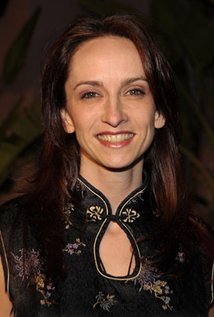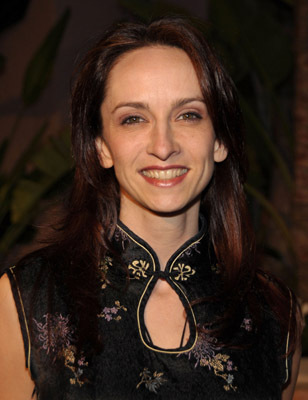Eliza Jane Schneider, actress, songstress, oral historian, dialect researcher, and playwright, has been fascinated by sound all her life. At age 7, she was recognized as a violin virtuoso, studying the Suzuki ear-training method at the Eastman School of Music, where she also studied classical voice. She now sings, plays, and writes music for televi...
Show more »
Eliza Jane Schneider, actress, songstress, oral historian, dialect researcher, and playwright, has been fascinated by sound all her life. At age 7, she was recognized as a violin virtuoso, studying the Suzuki ear-training method at the Eastman School of Music, where she also studied classical voice. She now sings, plays, and writes music for television and radio recording artists, and plays 11 instruments. She was raised on a Chippewa reservation by a German drama teacher/playwright and a Jewish legal aid attorney. By age twelve, she had gotten her Equity card playing an English role in "A Christmas Carol" and an American Southern role in "Inherit the Wind." She has traversed America ten times recording dialects, and distilled the enormous amount of information she accumulated into her critically acclaimed one-woman show, "Freedom Of Speech," in which she recreates 34 different dialect characters from all around the country. "Freedom Of Speech" premiered in the summer of 2003 at the New York International Fringe Festival to rave reviews and won the "Best Solo Show" award. It then ran Off-Broadway at P.S. 122 in the Spring of 2004, ending up at The Public Theater in the fall of 2005. The Washington Center for the Performing Arts and CitiStage/Symphony Hall in Springfield Massachusetts booked the popular show for their 2004-2005 seasons. She was profiled on the International Bravo! Network's "Arts & Minds" program, along with Sting.For five years, she voiced eight different female characters for Comedy Central's hit animated series South Park (1997). She's created multiple dialect characters for MTV's series, 3-South (2002), NBC's King of the Hill (1997), the Mel Gibson film, What Women Want (2000), and Pixar's smash feature, Finding Nemo (2003). On camera, she recurred on UPN's Girlfriends (2000) as a white girl, surprisingly fluent in "Ebonics". She also recurred as a Russian on NBC's Spy TV (2001), and is known in over 60 countries as series regular Liza, on CBS' Beakman's World (1992).She is a New York Foundation for the Arts (NYFA) sponsored playwright who has developed her plays, including "Sounds of Silence: A Documentary Puppet Musical Farce about the 2004 Election in Ohio," with dramaturges at the prestigious O'Neill Theater Center in New London, Connecticut, for the past two years. In 1998 her solo play, "USA 911" was critically acclaimed all the way from Madison Wisconsin to Kilkenny, Ireland, and won her inclusion in the California Arts Council's Touring Artist's Roster. Her first solo play, "Road Trip" won her a Drama-Logue Critic's Award for Outstanding Performance. A 20-year veteran of the stage, she has performed in dozens of other plays, including the title roles in Antigone and Agnes of God (another award winning performance). In 2000, "Blue Girl," her science fiction rock opera about the return of the goddess, won the LA Weekly's "Best of LA" award, and in that same year, she also starred in "Blue Girl" at the Mogodor Opera House in Paris, France as part of the 2000 Millennial New Year's celebration, with former cast members from the Cirque Du Soleil.Founder of the "Eliza Doolittle Dialects" school, she is often called upon to coach actors for dialect roles and to help foreigners speak English with an American accent. She organized numerous master-classes with Robert Easton for some of the other top voice artists in Hollywood. She studied dialects and acting at Northwestern University and UCLA, where she graduated with a BFA from the World Arts and Cultures Department in Theater. She wrote her senior thesis on American Regional Dialects, and then participated in the Dialect 2000 conference at Queens University Belfast dealing with Scottish, Ulster, and Hiberno-English. Some of her recordings were used in the creation of the book resulting from that conference, Language Links: The Languages of Scotland and Ireland (edited by John M Kirk and Donall P O Baoill, 2001.)In 2002, she recorded hundreds of Alaskan dialects, canvassing reservations, bars, and street-corners from Juneau to Barrow. In 2003, she attended the joint meeting of the Northern English Dialect Societies in Yorkshire and recorded additional dialects from Cumbria to East Anglia. In November of 2005, she added the dialects of South Africa to her DAT collection, and she plans to collect various dialects of the West Indies in March of 2006, while on a live tour of the songs from her new solo music album, "Gypsy Grass". She will continue to traverse the globe. So far, she has digitally recorded over 1200 interviews with native speakers of variant forms of English throughout the world.
Show less «




